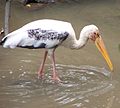Stork
| Storks | |
|---|---|

| |
| Painted stork | |
| Scientific classification | |
| Kingdom: | |
| Phylum: | |
| Class: | |
| Order: | |
| Family: | Ciconiidae Gray, 1840
|
Storks are a family of birds (Ciconiidae). They usually live near shallow bodies of water where they wade through the water, and catch small animals, like frogs, crabs, or small fish. Many species of stork are migratory, they spend the summer and the winter in different places. There are 19 different species of stork, in six genera. The marabou stork is the largest species of stork. The Abdim's stork is the smallest species of stork
Probably the best known stork is the white stork. It is known to build large nests in high places. Stork nests are often very large. They may be used for many years. Beforehand, people believed storks were monogamous, that they only had one partner in life. More recent research has shown that they may change partners. They are attached to a nest almost as much as to a partner.
The marabou stork, which lives in Africa, has a wingspan of up to 320 cm. This makes it the largest bird still alive, together with the Andean condor.
Species
[change | change source]There are nineteen species of stork. They include:
- Abdim's stork
- African openbill
- Asian openbill
- Asian woollyneck
- Black stork
- Black-backed stork
- Greater adjutant
- Jabiru
- Lesser adjutant
- Maguari stork
- Marabou stork
- Milky stork
- Oriental stork
- Painted stork
- Saddle-billed stork
- Storm's stork
- White stork
- Wood stork
- Yellow-billed stork
In fiction
[change | change source]The stork has many legends (stories) about it, as in the Ancient Greek storyteller's Aesop's (6th century BC) The Farmer and the Stork and The Fox and the Stork. The first fable (short story) begins with a farmer plowing his fields, planting his seeds and spreading his nets. These nets caught a few cranes who hopped behind him eating the seed. Along with the cranes in his net the farmer discovered a stork with a broken leg. The stork begged the farmer to spare his life, saying that he was not a crane, but a stork. He pointed to his feathers and told the farmer that they didn’t resemble a crane’s feathers at all. The farmer laughed at the stork and said, “I have taken you with these robbers (thieves), the cranes, and you must die in their company.” Another common legend is that storks deliver babies instead of the mothers giving birth.
Images
[change | change source]-
Black stork (C. nigra)
-
Marabou stork (Leptoptilos crumeniferus)
-
Glossy Ibis


